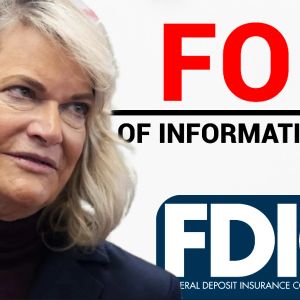The Federal Deposit Insurance Corporation (FDIC) is under fire after Senator Cynthia Lummis accused the agency of trying to bury evidence of its involvement in what the crypto community has dubbed “Operation Chokepoint 2.0.” In a scathing letter addressed to FDIC Chair Marty Gruenberg, Lummis revealed whistleblower allegations claiming the agency is destroying documents linked to its digital asset activities while threatening employees to keep quiet. “These actions are illegal and unacceptable,” Lummis wrote, demanding the immediate preservation of all documents, communications, and metadata related to digital assets since January 2022. She warned Gruenberg that any obstruction of Senate oversight would result in criminal referrals to the Department of Justice. The letter outlines allegations of staff being closely monitored to prevent leaks to the Senate, with some employees reportedly facing legal threats for speaking out. Whistleblowers, banks, and a crypto crackdown The whistleblower claims add a new layer to the FDIC ’s iron-fisted approach to crypto. Lummis alleged that documents relating to several key events—such as the liquidation of Silvergate Bank and the supervision of Signature Bank—are at risk of being destroyed. “You must cease and desist the destruction of materials immediately,” she demanded, adding that any classification of these records as “confidential” would not protect them from the Senate’s oversight powers. The letter identified eight categories of information the FDIC must preserve. These include supervision records for banks servicing crypto businesses, inter-agency communications about digital assets, and enforcement actions. Lummis also demanded the preservation of materials containing specific terms like “crypto,” “Bitcoin,” “Ethereum,” and “digital asset.” This wide-ranging demand underscores her frustration with what she described as evasive and obstructive behavior by federal regulators. Silvergate and Signature, who both provided services to major crypto firms, have been at the center of speculation about regulatory pressure. Critics argue their collapses were not coincidental but the result of a coordinated effort to choke off the crypto industry’s access to traditional banking. Origin of Operation Chokepoint 2.0 Operation Chokepoint 2.0 is a term that has gained traction among crypto enthusiasts. Many believe it’s a reboot of the Obama-era initiative aimed at cutting off banking services to industries deemed “high risk.” While the original program targeted payday lenders and firearms dealers, its sequel set its sights on crypto. Lummis’ accusations lend weight to the theory. She described the FDIC’s actions as part of a broader effort by regulators, including the SEC and OCC, to isolate crypto businesses from the financial system. Critics say these agencies are creating a chilling effect, where banks are too scared to work with crypto clients for fear of regulatory blowback. The timing of these allegations is telling. In the wake of high-profile bank failures and increased scrutiny of digital assets, the crypto industry has been grappling with what many see as a hostile regulatory environment. The collapses of Silvergate and Signature have been particularly damaging, not just for the firms themselves but for the broader perception of crypto’s place in the financial system. President Donald Trump, a vocal supporter of crypto, has pledged to dismantle Operation Chokepoint 2.0 when he gets back into office. “The crypto industry is being unfairly targeted,” he said, calling for an end to what he described as “a coordinated attack on innovation.” Meanwhile, the Biden administration has denied the existence of any such operation. Officials claim their actions are focused on combating fraud and ensuring financial stability, not targeting crypto specifically. But for many in the industry, these denials ring hollow. For Lummis and her allies, the stakes couldn’t be higher. She warned that any attempts to destroy evidence or obstruct oversight would be met with swift action. “If it is uncovered that you or your staff have knowingly destroyed materials or sought to obstruct the oversight functions of the Senate, I will make swift criminal referrals to the U.S. Department of Justice,” she wrote. A Step-By-Step System To Launching Your Web3 Career and Landing High-Paying Crypto Jobs in 90 Days.




















